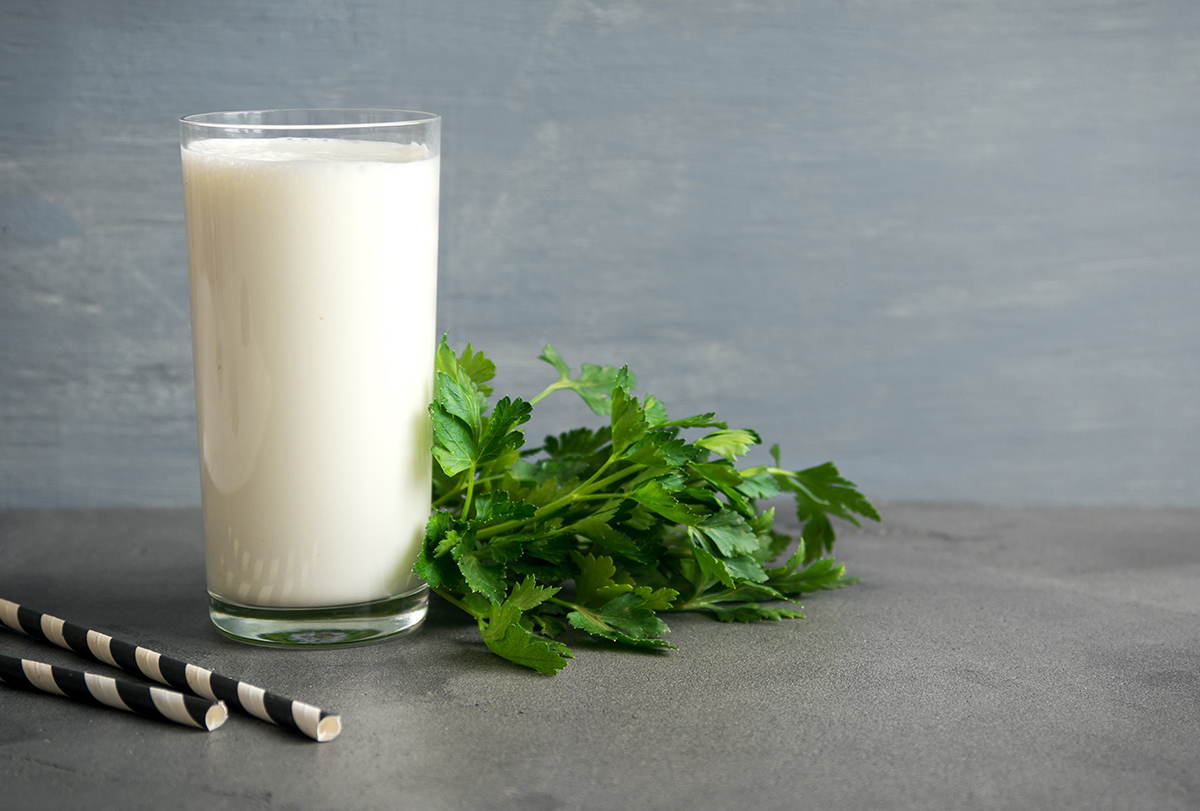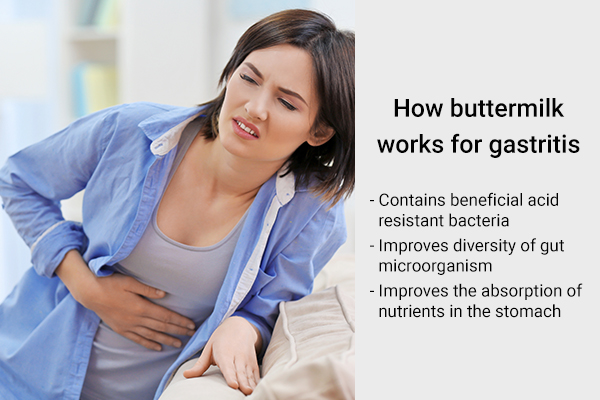In this article:
Gastritis – accompanied by symptoms of burning sensation in the chest and stomach, acid reflux, nausea, and belching – is one of the most bothersome digestive conditions. (1)

It is a condition that affects the stomach lining, also known as the mucosa. In gastritis, the stomach lining is inflamed. (2)
When the lining of the stomach, or gastric mucosa, swells up due to irritation, it causes intense pain. Along with increased acid reflux, loss of appetite and feeling of fullness may be persistent. (3)
Gastritis can occur due to many reasons. One of the most common is an H. pylori infection. Other reasons include: (1)
- Autoimmune conditions where the immune cells attack the lining of the stomach to increase acid production
- Acute stress
- Side effect of medication such as NSAIDs
- Excessive consumption of alcohol or smoking
Drinking buttermilk as part of the daily diet can be beneficial for gastritis.
What Is Buttermilk?
Buttermilk, as the name suggests, is obtained when milk is churned to obtain butter. Butter can be made from cultured or uncultured milk.
In the culture method, bacteria are added to milk to form a curd. This curd is then churned to separate out the fat solids (butter) and liquid buttermilk. This remaining liquid also contains the beneficial strain of bacteria.
With a slightly sour taste of its own, buttermilk is consumed as a popular beverage in South Asian countries either by itself or by adding salt and other flavors. (4)
Buttermilk is a rich source of protein and contains some amount of fat and healthy components that benefit and prevent the risk of many chronic illnesses such as diabetes, heart diseases, obesity, and also cancer. (4)
How Does Buttermilk Benefit Gastritis?

Buttermilk can improve gastritis in the following ways.
1. Provides beneficial acid-resistant bacteria
Probiotic foods that contain strains of beneficial bacteria have many health benefits. The lactobacillus that is mostly present in fermented foods is resistant to acid and bile in the stomach. This makes it a potent agent in the cure for gastritis.
Lab studies have found lactobacillus to reduce the activity of H. pylori by increasing lactic acid production. (5)
In a collection of studies, supplementing with a probiotic such as buttermilk was effective in eradicating H. pylori infections. (6)
2. Improves the diversity of gut microorganisms
The beneficial gut microorganisms present in the stomach flourish when supplemented with certain bacterial strains via food. Buttermilk, due to its lactobacillus content, is one example.
In a study of people given a high-dairy diet that included 250 ml of buttermilk daily, there was a significant increase in beneficial bacteria. (7)
The boosted gut microorganism diversity is particularly beneficial for protecting against and lowering gut inflammation, which may also aid in lowering the inflammation associated with gastritis. (8)
3. Improves the absorption of nutrients in the stomach
During the process of fermentation, lactobacillus acts on the sugar lactose present in milk to convert it to lactic acid. (4) As buttermilk is fermented, it also acquires a good amount of lactic acid, which can help increase the absorption of many nutrients in the stomach.
Studies have found lactic acid to improve the digestibility of proteins. (9) So, consuming buttermilk with a protein-rich meal can help with its digestion and prevent symptoms such as gas and bloating.
Moreover, foods fermented with lactobacillus such as buttermilk increase the absorption of minerals and prevent diarrhea associated with indigestion. (10)
Therefore, consuming a glass of buttermilk with your meals, especially heavy ones, can be beneficial for overall digestion.
Gut-Friendly Buttermilk Recipe
You can make flavored buttermilk in the following way:
- To a glass of buttermilk, add 1 pinch of salt.
- Add crushed mint leaves and dry roasted cumin powder.
- Chill the mixture for 30 minutes and consume.
Most-Asked Questions About Consuming Buttermilk
Can I consume buttermilk if I have lactose allergy/intolerance?

Buttermilk does contain some amount of lactose. However, some people with lactose intolerance can stand it without much complication if it fits in their lactose intolerance threshold.
However, people with a milk allergy need to completely avoid buttermilk.
Is sweet buttermilk also beneficial?
Buttermilk sweetened with sugar can also be consumed to aid gastritis. However, avoid adding excessive amounts of sugar.
What are the symptoms associated with gastritis?
Gastritis causes severe discomfort and symptoms that vary from person to person. Some symptoms you may want to watch out for include: (1)(11)
- Pain in the stomach
- Vomiting
- Heartburn
- Nausea
- Belching and bloating
Practical Takeaways
- Buttermilk is obtained when milk curd is churned to separate out butter. The liquid left behind contains beneficial bacteria and is called buttermilk.
- Due to its rich probiotic content, buttermilk can soothe gastritis by lowering inflammation, boosting the biodiversity of gut microorganisms, and lowering the spread of H. pylori, the bacteria that cause gastritis in most cases.
- Was this article helpful?
- YES, THANKS!NOT REALLY


